Table of Contents
Introduction: The Future Starts Here
Injective Protocol (INJ) has emerged as one of the most talked-about projects in the crypto space — especially as the narrative of real-world asset tokenization gains momentum. While many projects ride market hype without much substance, Injective stands out due to its strong fundamentals, institutional connections, and a growing ecosystem designed specifically for decentralized finance.
This post is a retail-focused, high-school-level deep dive into Injective. We’ll break down the essentials: what it is, who’s behind it, how it works, and why it matters. No jargon. No hype. Just facts. Let’s explore how Injective is positioning itself as a major player in the next evolution of blockchain finance.
What is Injective Protocol?
Injective is a Layer-1 blockchain custom-built for finance. It provides a fast, secure, and highly interoperable platform where developers, individuals, and institutions can create decentralized finance (DeFi) applications.
Key features:
- Near-zero gas fees
- Lightning-fast transactions
- Built on Cosmos with upcoming EVM compatibility
- Custom modules for DeFi (DEXs, derivatives, RWAs)
- Fully decentralized with governance via INJ token
Whether you’re a developer building the next DeFi app, an institution exploring tokenized finance, or a retail investor looking for solid projects, Injective aims to serve you.
Real-World Asset (RWA) Tokenization: A Growing Trend
One of Injective’s core strengths is its alignment with the real-world asset (RWA) tokenization narrative. This is where physical or traditional financial assets (like stocks, real estate, or commodities) are represented on the blockchain.
Why is this important?
- Brings trillions in traditional assets into crypto
- Makes financial systems more transparent and efficient
- Allows global access to investment opportunities
Injective is building the infrastructure to support this shift, making it a timely and relevant player in the market.
A Closer Look at the Injective Ecosystem
For Individuals (Retail Users)
Injective markets itself to individuals by offering:
- Ultrafast transaction speeds
- Minimal fees
- High liquidity across DeFi platforms
- Staking opportunities to earn passive income
Their flagship DEX, Helix, allows users to trade spot and derivatives with ease.
For Developers
Injective offers plug-and-play modules and support for multiple virtual machines (like EVM and SVM). This gives developers flexibility to build DeFi apps quickly, with full interoperability.
Key Dev Features:
- EVM compatibility (coming to mainnet)
- Support for multiple smart contract languages
- Extensive developer documentation
- Ecosystem incentives and grants
For Institutions
Injective is also targeting traditional financial institutions. Features like white-labeled DeFi modules, compliance tools, and tokenized asset support make Injective attractive for larger players looking to enter the blockchain space.
Partners include:
- Binance
- Jump Crypto
- Galaxy Digital
- Google Cloud
Tokenomics (INJ): Supply, Utility, and Burn Mechanism
INJ is the native token of the Injective ecosystem. Here’s how it works:
INJ Use Cases:
- Transaction Fees: Payable in INJ
- Staking: Helps secure the network and earn rewards
- Governance: Vote on proposals and upgrades
- Ecosystem Incentives: Used in various dApps
- Burn Mechanism: A weekly auction system removes INJ from circulation
Supply Overview:
- Max Supply: ~100 million INJ
- Current Circulating Supply: Nearly fully diluted
- Token Burn: Weekly auctions burn INJ tokens permanently
How the Burn Auction Works:
- Projects on Injective donate their native tokens to a “basket”
- Users bid INJ to win the basket
- The winning INJ bid is burned forever
This mechanism keeps inflation under control while also promoting ecosystem growth.
Injective’s Team: Strong Talent, Transparent Leadership
The team behind Injective Labs is public and active:
- Eric Chen (Co-founder & CEO): A recognized public figure who represents Injective at major crypto events. A solid communicator and leader.
- Albert Chon (Co-founder & CTO): A Stanford Computer Science graduate with experience at Amazon and OpenZeppelin. Brings deep technical expertise.
Injective has a large and globally distributed team across roles in engineering, marketing, business development, and more.
Governance: Community Power with Safeguards
Injective is governed by its community through a DAO (Decentralized Autonomous Organization).
- Proposals require a 100 INJ deposit
- If quorum isn’t met, the deposit is burned
- Voting lasts 4 days
This ensures only serious and thoughtful proposals go through.
Ecosystem Partnerships: More Than Just Logos
Injective features a large ecosystem, but not every logo on its site is a confirmed strategic partner.
Actual integrations and valuable ecosystem components include:
- Pyth Network (oracle)
- Helix (DEX)
- Hydro Protocol, Neptune Finance, Sonic, and others
- Google Cloud (node hosting)
Note: It’s important to separate marketing from meaningful partnerships. Always do your own research.
Learning & Documentation: Great for Beginners
Unlike many Layer-1 blockchains, Injective offers:
- A dedicated Learning Hub
- An up-to-date Blog
- GitHub & developer tools
This makes it easy for retail users to learn and for devs to build.
One critique: the Tokenomics Paper is a PDF from May 2024. A live GitBook-style page would allow easier updates and better transparency.
EVM Compatibility: The Next Major Milestone
EVM (Ethereum Virtual Machine) compatibility will allow developers to deploy Ethereum-based dApps directly onto Injective.
- Currently in beta
- Mainnet launch expected soon
- Will enable broader adoption
This is a major upgrade that will make Injective more interoperable with the broader DeFi ecosystem.
Social Presence & Community
Injective is active on:
- Twitter (X) with 500k+ followers
- Discord & Telegram for community engagement
Their social platforms are used not just for announcements but also for education, AMAs, and community building.
They’re also running an Ambassador Program for those looking to get involved.
Challenges and Areas to Improve
No project is perfect. Here are a few areas where Injective could improve:
- No formal roadmap: Their blog provides updates, but a dedicated roadmap would offer better visibility.
- Wallet distribution transparency: It’s unclear how much INJ is held by early investors and the team.
- Tokenomics document is static: A live-updated format would be more user-friendly.
- Clarify partnerships: Define actual integrations vs. marketing relationships.
Pros & Cons of Injective
Pros
- Lightning-fast transactions with near-zero gas fees
- Strong developer tools and EVM compatibility (in beta)
- Innovative burn mechanism to control supply and boost utility
- Built for DeFi and tokenized real-world assets (RWAs)
- Backed by major players like Binance, Jump Crypto, Google Cloud
- Active and transparent team with a strong technical background
- Robust ecosystem including Helix (DEX), Pyth, and more
Cons
- No formal roadmap publicly available
- Wallet distribution lacks transparency for early investors
- Tokenomics paper is static (PDF), not easily updated
- Some partnerships are unclear or loosely defined
- Heavy initial token allocation to early stakeholders
Final Thoughts: Is Injective Worth Watching?
Absolutely.
Injective offers a rare combination of speed, low costs, institutional-grade tooling, and strong tokenomics. With EVM compatibility on the horizon and a unique weekly burn mechanism already in place, it stands out as a serious contender in the DeFi Layer-1 space.
As real-world asset tokenization becomes a dominant theme in crypto, Injective is positioned to be one of the key platforms enabling that future.
Whether you’re a retail investor, a developer, or a financial institution, Injective is worth watching.

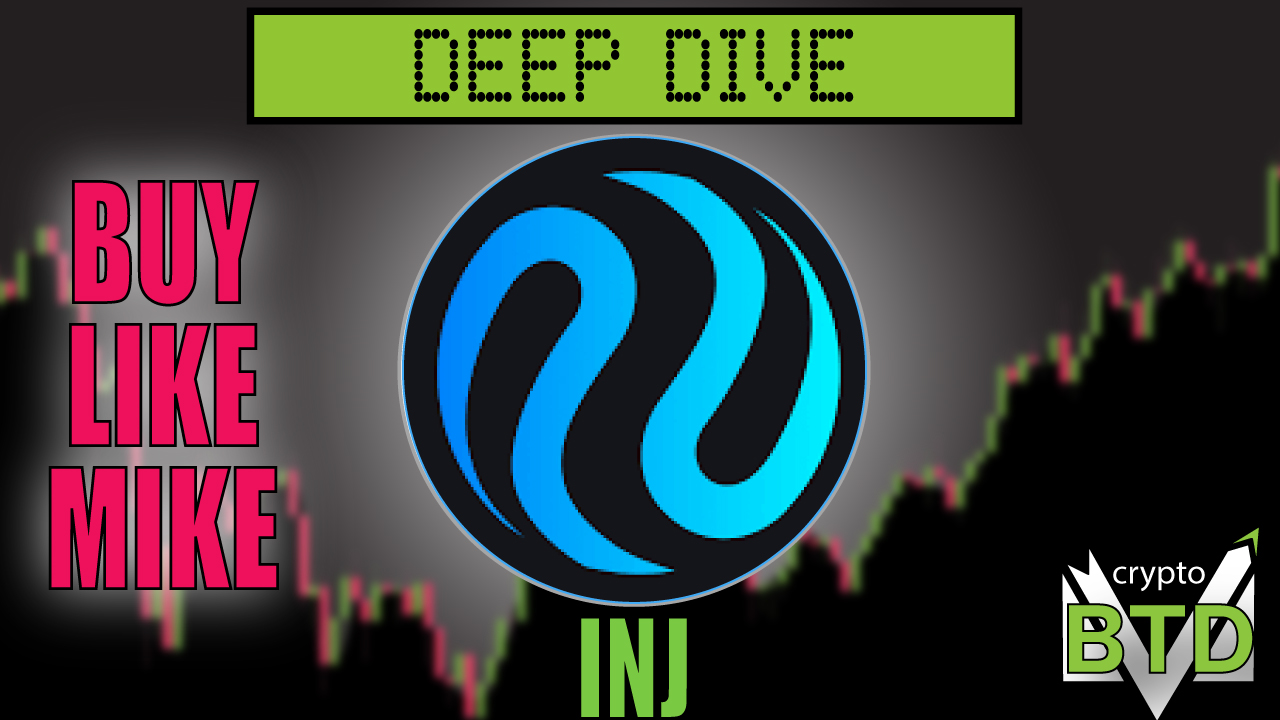
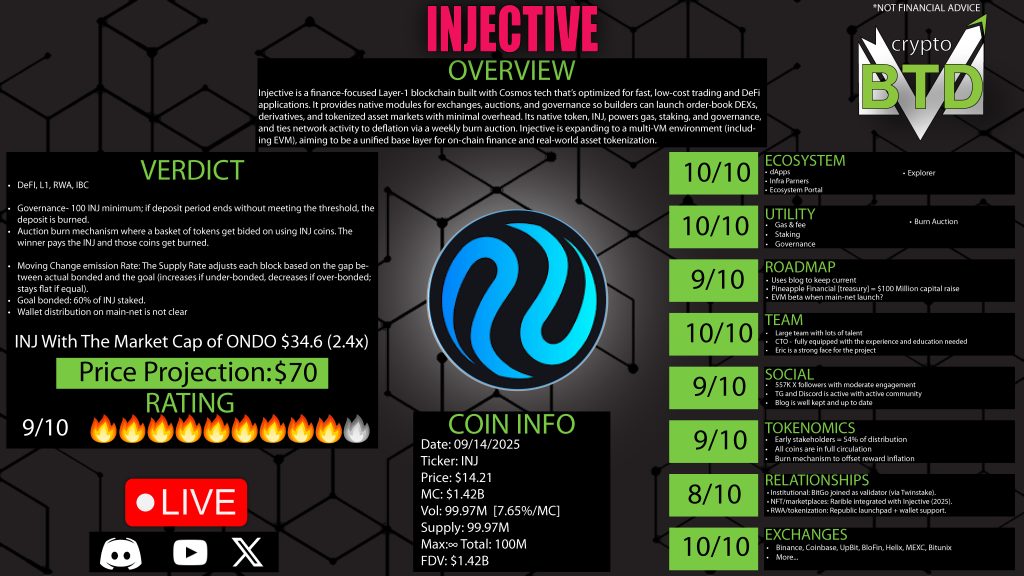
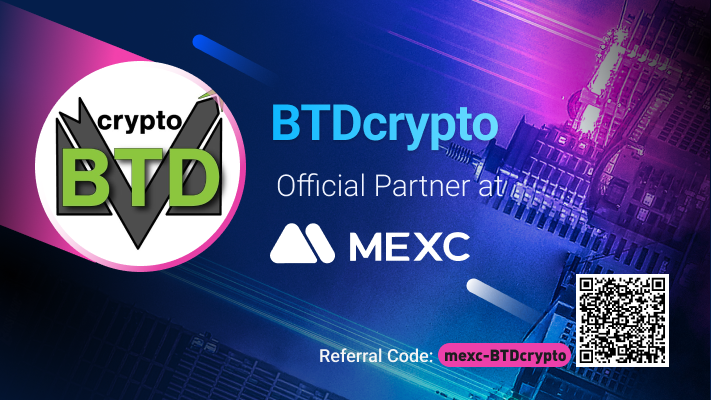



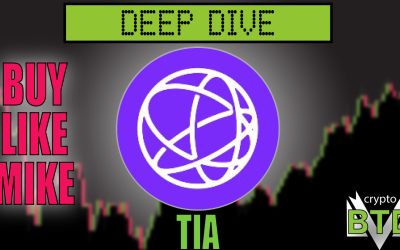
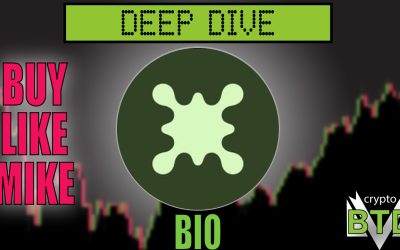
0 Comments